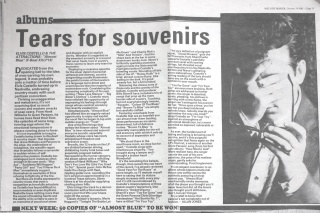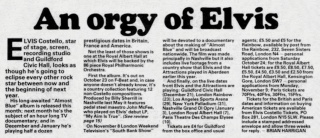Melody Maker, October 24, 1981: Difference between revisions
(+browser) |
(+text part 1) |
||
| Line 11: | Line 11: | ||
{{Bibliography text}} | {{Bibliography text}} | ||
Dedicated from the opening bell to the idea of over-carving his own legend, it was probably only a matter of time before Elvis Costello turned up in Nashville, embracing country music with such partisan conviction. | |||
Thriving on exaggeration and melodrama, it's not surprising that so much country and western smocks of soap opera. From Hank Williams to Gram Parsons, its heroes have loved their lives like episodes of some long-running saga where the emotional temperature is always running close to fever. | |||
Its not impossible to imagine Costello being drown to the devil in country music: that impulse that drove Williams and Parsons to the edge, the celebrations of indulgence, the maudlin regret that invariably follows a surrender to sudden whims of self-destructive passion. Costello has catalogued such instances often enough in his own work: "Riot Act," "Accidents Will Happen," "Party Girl" and "You'll Never Be A Man" immediately suggest themselves as examples of Elvis refusing to fight shy of the fire. | |||
But there are truths expressed in country music that even a songwriter as forcefully articulate as Costello has found difficult to accommodate or even duplicate. Nashville loves nothing more thee the sound of breaking hearts and the ability of its writers to zero in on moments of emotional stress and disaster with an explicit clarity. Whether it's regarded as the sweetest amnesty or a wound that never heals, love in country music seems to leave only tears for souvenirs. | |||
Displaying a voracious appetite for the sheer ''detail'' of personal upheaval and distress, country songwriting usually illuminates the painful ironies of the lovelorn in a language more direct and unambiguous than the majority of mainstream rock. Considering the increasing complexity of his own writing ("New Lace Sleeves," "Big Sister's Clothes), Costello must have relished this opportunity of expressing his feelings through songs whose succinct economy has recently evaded him. | |||
Simultaneously, ''Almost Blue'' has offered him an eagerly-seized opportunity to enjoy and exploit the vocal flair he began to tap with sudden energy on ''Trust''. | |||
One of the first things that strikes the listener about ''Almost Blue'' is how relaxed and assured everyone sounds, especially Costello whose voice has rarely enjoyed such freedom and expressive scope. | |||
Broadly, the 12 tracks on the LP are divided between driving, shellacking honky tonk tunes and exquisitely poignant ballads. Representing the former category, the album opens with a rollicking version of Hank Williams' "Why Don't You love Me (Like You Used To Do)." Special guest John McFee leads the charge with fleet, rippling guitar runs; sounding like he's served an apprenticeship in a hundred Texas saloons, Steve Nieve is at his shoulder supplying strafing piano frills. | |||
Elvis brings the track to a demon conclusion with a final exultant vocal yowl that lifts your knees right off the carpet. | |||
Classic drinker's laments, Merle Haggard's "Tonight The Bottle Let | |||
{{cx}} | {{cx}} | ||
''Remainder of text to come... | |||
{{Bibliography notes header}} | {{Bibliography notes header}} | ||
Revision as of 03:12, 9 October 2013
|



